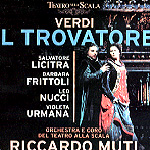No one would have guessed that the world needed another recording of Il trovatore, since there are more than two dozen available, of which a half dozen are more than good. But Riccardo Muti here presents a thrilling reading, taken from a series of live performances at La Scala in December of 2000, filled with a type of energy and remarkably chugging-along rhythm we rarely encounter live and even more rarely on disc. The score is presented complete, with no optional high notes (Muti attempts to justify the omission of Manrico’s optional high C at the close of “Di quella pira” in the booklet; it reads like nonsense), although both Leonora and Azucena add tiny but appealing embellishments (more like variations) to their vocal lines once or twice–how is that justified? Muti whips the orchestra into a fantastic frenzy during Manrico’s manic cabaletta; elsewhere it sighs with Leonora or accompanies ideally. Indeed, there is less of the oom-pah effect audible here than in any other performance of this work I can think of, and while the ghastly story unfolds well, it is the peaceful, one-on-one moments that stay in the memory. Muti’s use of non-gigantic voices (although where would he find gigantic Verdi voices today even if he wanted to?) attests to his approach: This is a drama of personal sadnesses.
The singing is mostly very high quality and each singer is made to articulate his or her staccatos (of which there are many–so much more noticeable on this recording than elsewhere) to great effect. Barbara Frittoli is an elegant Leonora, singing with accuracy and dignity. The sound itself is not soft and caressing, but she does nice things with words and dynamics. Salvatore Licitra appears to be a real “Italian” tenor, capable of nice mobidezza in “Ah si, ben mio”, and in the soft scenes with Azucena; elsewhere he’s generous of voice and exciting. Violetta Urmana has a voice almost too beautiful for Azucena; we’ve all come to prefer a chestier, more aggressive sound (Cossotto, Bumbry, etc), but here she’s in keeping with the intimacy Muti’s after and she sings not only realistically but gorgeously. Leo Nucci is a bit long in the tooth to be a brute of a di Luna and he occasionally wavers from pitch, but his innate musicality saves the day. Giorgio Giuseppini’s Ferrando is properly moody and he spins a good yarn. Perhaps the most impressive thing about this set is its rhythmic thrust and accuracy; no singer is allowed to hold back the musical line, and by not permitting any star-turn rubatos the action remains vibrant. The La Scala forces play and sing for Muti as if they feared for their lives; draw your own conclusions.
The engineers have captured the stage ambiance and balance beautifully while keeping extraneous sounds very limited; the audience members apparently were forced to sit on their hands until the end of acts and were threatened with death if they coughed or sniffled. In all, this Trovatore is an ear-opener, with great mid-Verdian style, among other things, to recommend it. And believe me, if it had a great high C at the close of you-know-what, it might have been even better. If Muti were to stop trying to prove points and settle for pleasing the audience, we’d all be better off.
































